- Home
- Henry James
The Bostonians, Vol. II Page 14
The Bostonians, Vol. II Read online
Page 14
Ransom, however, didn't much care whether it were good or not; he hadn't come to Marmion for the love of the hotel. Now that he had got there, however, he didn't know exactly what to do; his course seemed rather less easy than it had done when, suddenly, the night before, tired, sick of the city-air, and hungry for a holiday, he decided to take the next morning's train to Boston, and there take another to the shores of Buzzard's Bay. The hotel itself offered few resources; the inmates were not numerous; they moved about a little outside, on the small piazza and in the rough yard which interposed between the house and the road, and then they dropped off into the unmitigated dusk. This element, touched only in two or three places by a far-away dim glimmer, presented itself to Ransom as his sole entertainment. Though it was pervaded by that curious, pure, earthy smell which in New England, in summer, hangs in the nocturnal air, Ransom bethought himself that the place might be a little dull for persons who had not come to it, as he had, to take possession of Verena Tarrant. The unfriendly inn, which suggested dreadfully to Ransom (he despised the practice) an early bed-time, seemed to have no relation to anything, not even to itself; but a fellow-tenant of whom he made an inquiry told him the village was sprinkled round. Basil presently walked along the road in search of it, under the stars, smoking one of the good cigars which constituted his only tribute to luxury. He reflected that it would hardly do to begin his attack that night; he ought to give the Bostonians a certain amount of notice of his appearance on the scene. He thought it very possible, indeed, that they might be addicted to the vile habit of "retiring" with the cocks and hens. He was sure that was one of the things Olive Chancellor would do so long as he should stay—on purpose to spite him; she would make Verena Tarrant go to bed at unnatural hours, just to deprive him of his evenings. He walked some distance without encountering a creature or discerning an habitation; but he enjoyed the splendid starlight, the stillness, the shrill melancholy of the crickets, which seemed to make all the vague forms of the country pulsate around him; the whole impression was a bath of freshness after the long strain of the preceding two years and his recent sweltering weeks in New York. At the end of ten minutes (his stroll had been slow) a figure drew near him, at first indistinct, but presently defining itself as that of a woman. She was walking apparently without purpose, like himself, or without other purpose than that of looking at the stars, which she paused for an instant, throwing back her head, to contemplate, as he drew nearer to her. In a moment he was very close; he saw her look at him, through the clear gloom, as they passed each other. She was small and slim; he made out her head and face, saw that her hair was cropped; had an impression of having seen her before. He noticed that as she went by she turned as well as himself, and that there was a sort of recognition in her movement. Then he felt sure that he had seen her elsewhere, and before she had added to the distance that separated them he stopped short, looking after her. She noticed his halt, paused equally, and for a moment they stood there face to face, at a certain interval, in the darkness.
"I beg your pardon—is it Doctor Prance?" he found himself demanding.
For a minute there was no answer; then came the voice of the little lady:
"Yes, sir; I am Doctor Prance. Any one sick at the hotel?"
"I hope not; I don't know," Ransom said, laughing.
Then he took a few steps, mentioned his name, recalled his having met her at Miss Birdseye's, ever so long before (nearly two years), and expressed the hope that she had not forgotten that.
She thought it over a little—she was evidently addicted neither to empty phrases nor to unconsidered assertions. "I presume you mean that night Miss Tarrant launched out so."
"That very night. We had a very interesting conversation."
"Well, I remember I lost a good deal," said Doctor Prance.
"Well, I don't know; I have an idea you made it up in other ways," Ransom returned, laughing still.
He saw her bright little eyes engage with his own. Staying, apparently, in the village, she had come out, bare-headed, for an evening walk, and if it had been possible to imagine Doctor Prance bored and in want of recreation, the way she lingered there as if she were quite willing to have another talk might have suggested to Basil Ransom this condition. "Why, don't you consider her career very remarkable?"
"Oh yes; everything is remarkable nowadays; we live in an age of wonders!" the young man replied, much amused to find himself discussing the object of his adoration in this casual way, in the dark, on a lonely country-road, with a short-haired female physician. It was astonishing how quickly Doctor Prance and he had made friends again. "I suppose, by the way, you know Miss Tarrant and Miss Chancellor are staying down here?" he went on.
"Well, yes, I suppose I know it. I am visiting Miss Chancellor," the dry little woman added.
"Oh indeed? I am delighted to hear it!" Ransom exclaimed, feeling that he might have a friend in the camp. "Then you can inform me where those ladies have their house."
"Yes, I guess I can tell it in the dark. I will show you round now, if you like."
"I shall be glad to see it, though I am not sure I shall go in immediately. I must reconnoitre a little first. That makes me so very happy to have met you. I think it's very wonderful—your knowing me."
Doctor Prance did not repudiate this compliment, but she presently observed: "You didn't pass out of my mind entirely, because I have heard about you since, from Miss Birdseye."
"Ah yes, I saw her in the spring. I hope she is in health and happiness."
"She is always in happiness, but she can't be said to be in health. She is very weak; she is failing."
"I am very sorry for that."
"She is also visiting Miss Chancellor," Doctor Prance observed, after a pause which was an illustration of an appearance she had of thinking that certain things didn't at all imply some others.
"Why, my cousin has got all the distinguished women!" Basil Ransom exclaimed.
"Is Miss Chancellor your cousin? There isn't much family resemblance. Miss Birdseye came down for the benefit of the country air, and I came down to see if I could help her to get some good from it. She wouldn't much, if she were left to herself. Miss Birdseye has a very fine character, but she hasn't much idea of hygiene." Doctor Prance was evidently more and more disposed to be chatty. Ransom appreciated this fact, and said he hoped she, too, was getting some good from the country-air—he was afraid she was very much confined to her profession, in Boston; to which she replied—"Well, I was just taking a little exercise along the road. I presume you don't realise what it is to be one of four ladies grouped together in a small frame-house."
Ransom remembered how he had liked her before, and he felt that, as the phrase was, he was going to like her again. He wanted to express his good-will to her, and would greatly have enjoyed being at liberty to offer her a cigar. He didn't know what to offer her or what to do, unless he should invite her to sit with him on a fence. He did realise perfectly what the situation in the small frame-house must be, and entered with instant sympathy into the feelings which had led Doctor Prance to detach herself from the circle and wander forth under the constellations, all of which he was sure she knew. He asked her permission to accompany her on her walk, but she said she was not going much further in that direction; she was going to turn round. He turned round with her, and they went back together to the village, in which he at last began to discover a certain consistency, signs of habitation, houses disposed with a rough resemblance to a plan. The road wandered among them with a kind of accommodating sinuosity, and there were even cross-streets, and an oil-lamp on a corner, and here and there the small sign of a closed shop, with an indistinctly countrified lettering. There were lights now in the windows of some of the houses, and Doctor Prance mentioned to her companion several of the inhabitants of the little town, who appeared all to rejoice in the prefix of captain. They were retired shipmasters; there was quite a little nest of these worthies, two or three of whom might be seen lingering in their
dim doorways, as if they were conscious of a want of encouragement to sit up, and yet remembered the nights in far-away waters when they would not have thought of turning in at all. Marmion called itself a town, but it was a good deal shrunken since the decline in the shipbuilding interest; it turned out a good many vessels every year, in the palmy days, before the war. There were shipyards still, where you could almost pick up the old shavings, the old nails and rivets, but they were grass-grown now, and the water lapped them without anything to interfere. There was a kind of arm of the sea put in; it went up some way, it wasn't the real sea, but very quiet, like a river; that was more attractive to some. Doctor Prance didn't say the place was picturesque, or quaint, or weird; but he could see that was what she meant when she said it was mouldering away. Even under the mantle of night he himself gathered the impression that it had had a larger life, seen better days. Doctor Prance made no remark designed to elicit from him an account of his motives in coming to Marmion; she asked him neither when he had arrived nor how long he intended to stay. His allusion to his cousinship with Miss Chancellor might have served to her mind as a reason; yet, on the other hand, it would have been open to her to wonder why, if he had come to see the young ladies from Charles Street, he was not in more of a hurry to present himself. It was plain Doctor Prance didn't go into that kind of analysis. If Ransom had complained to her of a sore throat she would have inquired with precision about his symptoms; but she was incapable of asking him any question with a social bearing. Sociably enough, however, they continued to wander through the principal street of the little town, darkened in places by immense old elms, which made a blackness overhead. There was a salt smell in the air, as if they were nearer the water; Doctor Prance said that Olive's house was at the other end.
"I shall take it as a kindness if, for this evening, you don't mention that you have happened to meet me," Ransom remarked, after a little. He had changed his mind about giving notice.
"Well, I wouldn't," his companion replied; as if she didn't need any caution in regard to making vain statements.
"I want to keep my arrival a little surprise for to-morrow. It will be a great pleasure to me to see Miss Birdseye," he went on, rather hypocritically, as if that at bottom had been to his mind the main attraction of Marmion.
Doctor Prance did not reveal her private comment, whatever it was, on this intimation; she only said, after some hesitation—"Well, I presume the old lady will take quite an interest in your being here."
"I have no doubt she is capable even of that degree of philanthropy."
"Well, she has charity for all, but she does—even she—prefer her own side. She regards you as quite an acquisition."
Ransom could not but feel flattered at the idea that he had been a subject of conversation—as this implied—in the little circle at Miss Chancellor's; but he was at a loss, for the moment, to perceive what he had done up to this time to gratify the senior member of the group. "I hope she will find me an acquisition after I have been here a few days," he said, laughing.
"Well, she thinks you are one of the most important converts yet," Doctor Prance replied, in a colourless way, as if she would not have pretended to explain why.
"A convert—me? Do you mean of Miss Tarrant's?" It had come over him that Miss Birdseye, in fact, when he was parting with her after their meeting in Boston, had assented to his request for secrecy (which at first had struck her as somewhat unholy) on the ground that Verena would bring him into the fold. He wondered whether that young lady had been telling her old friend that she had succeeded with him. He thought this improbable; but it didn't matter, and he said, gaily, "Well, I can easily let her suppose so!"
It was evident that it would be no easier for Doctor Prance to subscribe to a deception than it had been for her venerable patient; but she went so far as to reply, "Well, I hope you won't let her suppose you are where you were that time I conversed with you. I could see where you were then!"
"It was in about the same place you were, wasn't it?"
"Well," said Doctor Prance, with a small sigh, "I am afraid I have moved back, if anything!" Her sigh told him a good deal; it seemed a thin, self-controlled protest against the tone of Miss Chancellor's interior, of which it was her present fortune to form a part: and the way she hovered round, indistinct in the gloom, as if she were rather loath to resume her place there, completed his impression that the little doctress had a line of her own.
"That, at least, must distress Miss Birdseye," he said reproachfully.
"Not much, because I am not of importance. They think women the equals of men; but they are a great deal more pleased when a man joins than when a woman does."
Ransom complimented Doctor Prance on the lucidity of her mind, and then he said: "Is Miss Birdseye really sick? Is her condition very precarious?"
"Well, she is very old, and very—very gentle," Doctor Prance answered, hesitating a moment for her adjective. "Under those circumstances a person may flicker out."
"We must trim the lamp," said Ransom; "I will take my turn, with pleasure, in watching the sacred flame."
"It will be a pity if she doesn't live to hear Miss Tarrant's great effort," his companion went on.
"Miss Tarrant's? What's that?"
"Well, it's the principal interest, in there." And Doctor Prance now vaguely indicated, with a movement of her head, a small white house, much detached from its neighbours, which stood on their left, with its back to the water, at a little distance from the road. It exhibited more signs of animation than any of its fellows; several windows, notably those of the ground floor, were open to the warm evening, and a large shaft of light was projected upon the grassy wayside in front of it. Ransom, in his determination to be discreet, checked the advance of his companion, who added presently, with a short, suppressed laugh—"You can see it is, from that!" He listened, to ascertain what she meant, and after an instant a sound came to his ear—a sound he knew already well, which carried the accents of Verena Tarrant, in ample periods and cadences, out into the stillness of the August night.
"Murder, what a lovely voice!" he exclaimed involuntarily.
Doctor Prance's eye gleamed towards him a moment, and she observed, humorously (she was relaxing immensely), "Perhaps Miss Birdseye is right!" Then, as he made no rejoinder, only listening to the vocal inflexions that floated out of the house, she went on—"She's practising her speech."
"Her speech? Is she going to deliver one here?"
"No, as soon as they go back to town—at the Music Hall."
Ransom's attention was now transferred to his companion. "Is that why you call it her great effort?"
"Well, so they think it, I believe. She practises that way every night; she reads portions of it aloud to Miss Chancellor and Miss Birdseye."
"And that's the time you choose for your walk?" Ransom said, smiling.
"Well, it's the time my old lady has least need of me; she's too absorbed."
Doctor Prance dealt in facts; Ransom had already discovered that; and some of her facts were very interesting.
"The Music Hall—isn't that your great building?" he asked.
"Well, it's the biggest we've got; it's pretty big, but it isn't so big as Miss Chancellor's ideas," added Doctor Prance. "She has taken it to bring out Miss Tarrant before the general public—she has never appeared that way in Boston—on a great scale. She expects her to make a big sensation. It will be a great night, and they are preparing for it. They consider it her real beginning."
"And this is the preparation?" Basil Ransom said.
"Yes; as I say, it's their principal interest."
Ransom listened, and while he listened he meditated. He had thought it possible Verena's principles might have been shaken by the profession of faith to which he treated her in New York; but this hardly looked like it. For some moments Doctor Prance and he stood together in silence.
"You don't hear the words," the doctor remarked, with a smile which, in the dark, looked Mephistophelean.<
br />
"Oh, I know the words!" the young man exclaimed, with rather a groan, as he offered her his hand for good-night.

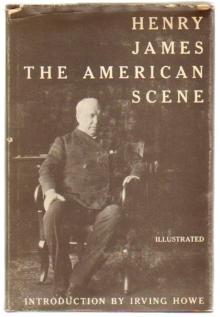 The American
The American The Wings of the Dove, Volume 1 of 2
The Wings of the Dove, Volume 1 of 2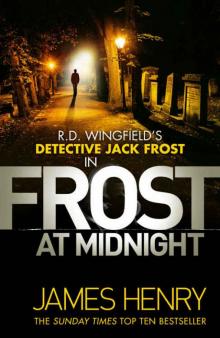 Frost at Midnight
Frost at Midnight Morning Frost
Morning Frost The Portrait of a Lady — Volume 1
The Portrait of a Lady — Volume 1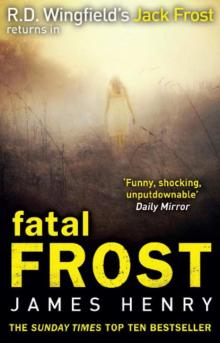 Fatal Frost
Fatal Frost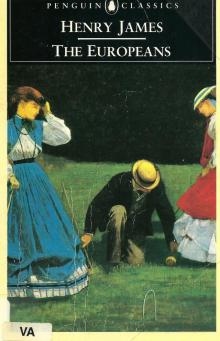 The Europeans
The Europeans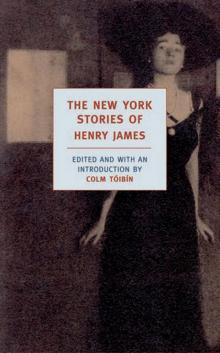 The New York Stories of Henry James
The New York Stories of Henry James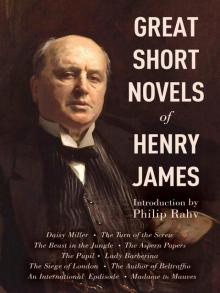 Great Short Novels of Henry James
Great Short Novels of Henry James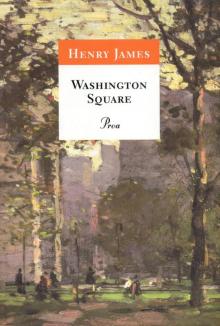 Washington Square
Washington Square The Portrait of a Lady — Volume 2
The Portrait of a Lady — Volume 2 The Ambassadors
The Ambassadors The Wings of the Dove
The Wings of the Dove The Princess Casamassima (Classics)
The Princess Casamassima (Classics) The Coxon Fund
The Coxon Fund First Frost
First Frost Henry James
Henry James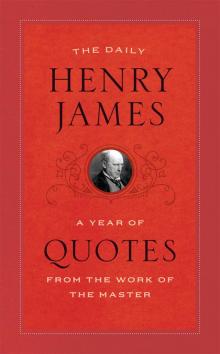 The Daily Henry James
The Daily Henry James Travels With Henry James
Travels With Henry James The Reverberator: A Novel
The Reverberator: A Novel What Maisie Knew (Henry James Collection)
What Maisie Knew (Henry James Collection)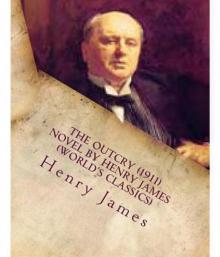 The Outcry
The Outcry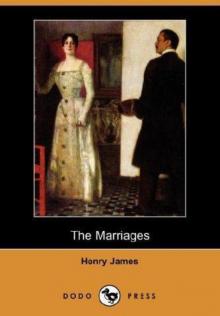 The Marriages
The Marriages The Wings of the Dove, Volume 2
The Wings of the Dove, Volume 2 The Bostonians, Vol. I
The Bostonians, Vol. I The Outcry: -1911
The Outcry: -1911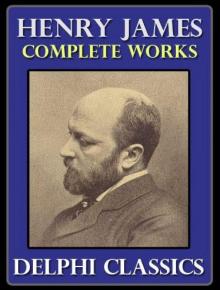 The Complete Works of Henry James
The Complete Works of Henry James Letters from the Palazzo Barbaro
Letters from the Palazzo Barbaro The Pupil
The Pupil The Bostonians, Vol. II
The Bostonians, Vol. II Pandora
Pandora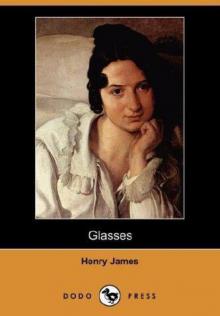 Glasses
Glasses The Princess Casamassima
The Princess Casamassima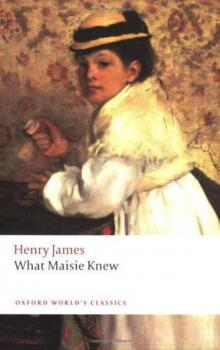 What Maisie Knew
What Maisie Knew The Reverberator
The Reverberator The Golden Bowl - Complete
The Golden Bowl - Complete Confidence
Confidence Wings of the Dove (Barnes & Noble Classics Series)
Wings of the Dove (Barnes & Noble Classics Series) The Spoils of Poynton
The Spoils of Poynton